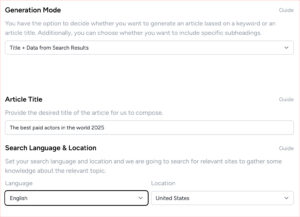In a world where information flows incessantly and the demand for timely news is ever-growing, we find ourselves increasingly turning to the marvels of technology.
As we navigate through this digital age, AI-generated news has emerged as a groundbreaking phenomenon, reshaping the landscape of journalism.
We stand at the intersection of innovation and skepticism, pondering the accuracy and reliability of these AI-crafted narratives. Are these algorithm-driven stories a beacon of efficiency and precision, or do they harbor potential pitfalls that could mislead the public?
Together, we will delve into the mechanics behind AI-generated news, scrutinize its performance against traditional journalism, and explore the ethical implications that come with entrusting machines to inform our society.
By examining:
- Case studies
- Expert opinions
- Statistical analyses
we aim to uncover whether AI-generated news can truly be relied upon to uphold the standards of truth and integrity that our communities deserve.
The Rise of AI-Generated News
In recent years, we’ve seen a significant increase in news articles generated by artificial intelligence. These AI systems promise to streamline content creation, offering us a faster way to access information.
However, as a community that values accurate and reliable news, we need to be cautious. While AI can process vast amounts of data quickly, ensuring the accuracy of this information is crucial. We’ve all encountered misinformation online, and the rise of AI-generated news can potentially exacerbate this issue.
Our trust in news sources hinges on their reliability. When AI generates articles, it must be held to the same standards as human journalists. We should work together to scrutinize these AI-generated pieces, ensuring they meet our expectations for truthfulness and integrity.
By staying vigilant and demanding high standards, we can navigate this new landscape confidently, embracing the benefits of AI while safeguarding our commitment to accurate, reliable news.
Ethical Concerns in AI Journalism
Navigating the ethical concerns in AI journalism requires us to critically evaluate the implications of machine-generated content on our society and values.
We must ask ourselves: Can we trust the accuracy and reliability of AI-generated news? It’s not just about getting the facts right; it’s about ensuring the integrity of the information that shapes our collective understanding.
When AI systems produce news, the risk of misinformation increases. Algorithms can inadvertently spread falsehoods, either through data errors or biases embedded in their coding. This isn’t just a technical issue; it’s a moral one.
As a community, we depend on accurate and reliable news to make informed decisions. If AI-generated content undermines this trust, the very foundation of our societal discourse is at risk.
We must actively engage in discussions about these ethical dilemmas. Together, we can establish guidelines that ensure AI journalism serves the public good, maintaining the standards we hold dear.
Key considerations include:
- Transparency about the use of AI in content creation
- Accountability for the accuracy of the information produced
- Measures to detect and correct biases in algorithms
- Ethical guidelines for the deployment and use of AI in journalism
By addressing these issues, we can work towards a future where AI journalism enhances rather than detracts from the quality and reliability of news.
Impact on Traditional News Outlets
The rise of AI-generated news is reshaping the landscape for traditional news outlets, challenging their roles and business models.
As we navigate this shift, we can’t ignore the concerns about accuracy and reliability. Traditional newsrooms have long been the gatekeepers of verified information, but now they face competition from AI systems capable of producing content at unprecedented speeds.
We worry that the rush to embrace AI might compromise the accuracy we’ve come to expect from established news sources:
- Misinformation can spread more rapidly if AI-generated articles aren’t rigorously fact-checked.
- Our trust in traditional outlets stems from their commitment to reliability, a standard that AI must meet to gain acceptance.
Yet, there’s potential for collaboration. By integrating AI tools, traditional outlets can enhance their efficiency while maintaining their core values:
- Together, we can ensure that the news remains a trusted source.
- Blending human judgment with technological advancements can effectively combat misinformation.
Evaluating AI News Accuracy
When we evaluate AI-generated news, it’s crucial to consider the methods used to ensure factual correctness and the potential for human oversight.
AI’s capacity to process vast amounts of data quickly must be balanced with accuracy and reliability. To achieve this:
- Integrate fact-checking algorithms.
- Regularly update AI’s databases to help mitigate the spread of misinformation.
Human oversight remains essential to:
- Cross-check information.
- Provide contextual understanding that machines might miss.
By fostering a collaborative environment between AI and human editors, we can enhance the credibility of AI-generated content.
We should also promote transparency about the sources and methods AI uses. This transparency builds trust and ensures that, as consumers of news, we feel confident in the accuracy and reliability of the information presented.
Let’s strive together for a future where technology and human insight coalesce to deliver trustworthy news.
Challenges in Ensuring Reliability
Ensuring the reliability of AI-generated news presents several significant challenges that we must address head-on.
First, there’s the issue of accuracy. We need to ensure that the data fed into AI systems is both up-to-date and factually correct. If the input data is biased or erroneous, the resulting news will reflect those flaws, compromising reliability.
Moreover, combating misinformation is crucial. AI systems can inadvertently amplify false information if they’re not carefully monitored. We need robust algorithms that can discern credible sources from dubious ones. This requires:
- Continuous improvement
- Vigilant oversight
Another challenge lies in the complexity of human language. AI struggles with nuances, context, and cultural differences, which can lead to misinterpretations and errors. We must work together to refine these systems, ensuring they can handle the subtleties of language accurately.
By addressing these challenges, we can strive for a future where AI-generated news is both reliable and accurate, fostering a community grounded in trustworthy information.
Trustworthiness of AI-Generated Content
Building trust in AI-generated content requires us to implement rigorous standards and transparent practices.
We need to ensure that the information produced by AI systems is both accurate and reliable. By setting high benchmarks for accuracy, we can minimize the spread of misinformation, which is critical for maintaining the credibility of AI-generated news.
One of the essential steps we can take is to develop clear guidelines for AI content creation.
These guidelines should prioritize:
- Fact-checking
- Cross-referencing with credible sources
Additionally, transparency about how AI algorithms operate will help foster trust.
When we know the methods used to generate news, we feel more connected and confident in its reliability.
It’s also crucial to regularly audit and update these systems to adapt to new information and scenarios.
By staying proactive, we can ensure that AI-generated content serves as a trustworthy resource, reinforcing our sense of community and shared understanding.
Together, we can build a more informed and united audience.
User Perception and Acceptance
Understanding how users perceive and accept AI-generated news is crucial for its successful integration into mainstream media.
We need to recognize that accuracy and reliability are at the heart of user acceptance. People want to trust the information they consume, and any hint of misinformation can quickly erode that trust.
When we consider the accuracy of AI-generated news, it’s essential that the content aligns with factual information.
Users are more likely to embrace AI-generated news if they see consistency and reliability in the reporting. It’s about creating a sense of belonging in a community where truth and transparency are valued.
Moreover, the reliability of AI systems plays a significant role in user perception.
If users believe the technology is prone to errors or misinformation, they’ll be less inclined to accept it. By demonstrating that AI can deliver accurate and reliable news consistently, we can foster a community that’s more open to and comfortable with this technological advancement.
Combating Misinformation with AI
AI technology offers us powerful tools to combat the spread of misinformation in today’s fast-paced digital landscape.
As a community, we’re constantly seeking accurate and reliable information to stay informed and connected.
AI-driven systems can sift through massive amounts of data, identifying patterns that indicate false or misleading content. By doing so, they help us ensure that the information we share and consume maintains high standards of accuracy and reliability.
Together, we can leverage these AI tools to flag and correct misinformation before it gains traction.
These systems can:
- Cross-reference multiple credible sources
- Provide us with a clearer picture of the truth
Moreover, AI can adapt and learn from new data, improving its effectiveness in real-time.
By embracing AI technology, we’re taking active steps to foster a more informed and trustworthy digital environment. Let’s work together to make sure our shared knowledge is both accurate and reliable, reducing the impact of misinformation on our society.
Benefits of AI-Generated News
AI-generated news offers numerous advantages that can enhance our information consumption experience.
Firstly, the accuracy of AI systems can significantly reduce human error in reporting. By cross-referencing multiple sources and utilizing advanced algorithms, AI ensures that the information we receive is both precise and up-to-date. This level of accuracy builds our trust in the news we consume, fostering a more informed community.
Moreover, the reliability of AI-generated news is another significant benefit. These systems operate 24/7, providing us with consistent updates without the biases or fatigue that human journalists might experience. This reliability helps us stay connected and well-informed, making us feel more united in our understanding of current events.
Lastly, AI can effectively combat misinformation. By swiftly identifying and correcting false information, AI-generated news helps maintain the integrity of the information ecosystem. This proactive approach not only enhances our confidence in the news but also strengthens our communal bond through shared, accurate knowledge.
Future Trends in AI Journalism
As we look ahead, the evolution of AI journalism promises groundbreaking changes that will redefine the way we consume and interact with news.
AI’s potential to enhance accuracy and reliability in reporting is monumental.
By analyzing vast amounts of data in real-time, AI can help us sift through the noise to deliver precise and trustworthy information.
This shift means we can stay informed without the constant worry of misinformation clouding our judgment.
Moreover, the integration of AI in journalism fosters a sense of community.
We’ll feel more connected by sharing accurate and reliable stories that matter to us.
AI can personalize news feeds, ensuring we receive content that aligns with our interests and values.
This personalized approach not only keeps us engaged but also fosters a shared sense of belonging.
In this new era, the fight against misinformation becomes a collective effort.
Together, with the aid of AI, we can build a more informed and united society.
Regulatory Frameworks for AI News
As AI continues to revolutionize journalism, it’s crucial that we establish robust regulatory frameworks to ensure ethical and transparent practices. We all want to trust the news we consume, and that trust hinges on the accuracy and reliability of the information presented.
By implementing stringent regulations, we can minimize the risks of misinformation spreading through AI-generated content.
These frameworks should include:
- Clear guidelines for verifying sources
- Fact-checking data
- Maintaining editorial oversight
This way, we can ensure that the news generated by AI meets the same standards as traditional journalism. Our collective effort will help maintain public trust and safeguard the integrity of our news sources.
Moreover, involving a diverse group of stakeholders can enrich the regulatory process. These stakeholders should include:
- Journalists
- Technologists
- Everyday citizens
When we all come together to build these frameworks, we foster a sense of community and shared responsibility. Together, we can navigate the complexities of AI in journalism, ensuring it serves the public good.
AI Journalism and Media Bias
As we delve into AI journalism, it’s essential to address the potential for media bias and its implications on public perception.
We know that AI systems are trained on existing data, which can carry inherent biases. If these biases aren’t identified and corrected, they can lead to misinformation, impacting the accuracy and reliability of the news we consume.
We crave trustworthy sources, and AI has the potential to provide that, but it must be implemented responsibly. AI-driven news can amplify existing biases if not carefully monitored.
When algorithms:
- Prioritize sensational content
- Echo popular opinions
They risk:
- Marginalizing diverse perspectives
- Perpetuating misinformation
By understanding the limitations and strengths of AI journalism, we can better navigate this evolving landscape.
We must demand transparency in how AI systems are developed and used in media.
Together, we can ensure that AI contributes positively, enhancing the accuracy and reliability of the news we rely on daily.
Human Oversight in AI Reporting
Human oversight is crucial in AI reporting to ensure the integrity and accountability of the information presented.
As a community striving for accurate and reliable news, we can’t solely rely on algorithms.
While AI can process vast amounts of data quickly, it can also propagate misinformation if left unchecked. By incorporating human oversight, we safeguard against the spread of inaccuracies that could mislead our audience.
We need to remember that machines lack the nuanced understanding of context and ethical considerations that human editors bring to the table.
By working together, humans and AI can complement each other:
- AI enhances speed and efficiency
- Human oversight ensures the accuracy and reliability of the content
This partnership helps us maintain the trust of our readers and fosters a sense of belonging in our shared commitment to truth.
Let’s embrace this collaborative approach to create a balanced and trustworthy news ecosystem, making sure misinformation doesn’t stand a chance.
Enhancing Credibility in AI News
In our quest to enhance credibility in AI-generated news, we must prioritize transparency and ethical standards in every step of the process. By doing so, we foster a sense of trust and community among our audience.
Accuracy and reliability are paramount; we need to ensure that our AI systems are rigorously tested and continuously updated to avoid the pitfalls of misinformation.
To achieve this, we should:
- Openly disclose our AI’s data sources and algorithms
- Allow for public scrutiny and feedback
This openness helps us maintain high standards and fosters a collaborative environment where everyone feels part of the mission.
Additionally, implementing robust fact-checking mechanisms and involving human oversight can further bolster the reliability of AI-generated news.
Together, by committing to these practices, we can build a trustworthy AI news ecosystem. We can ensure that our audience receives accurate and reliable information, free from the dangers of misinformation, thereby strengthening the bond within our community.





